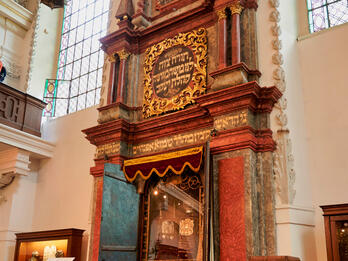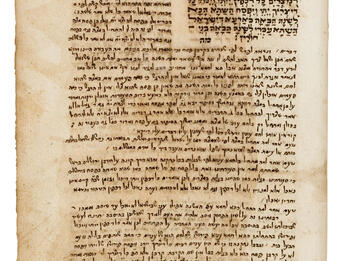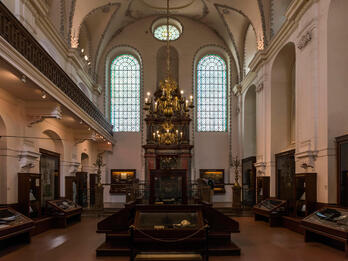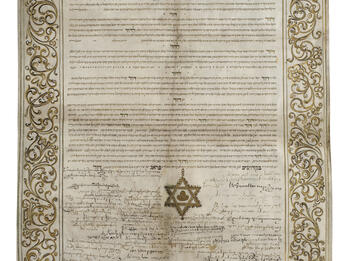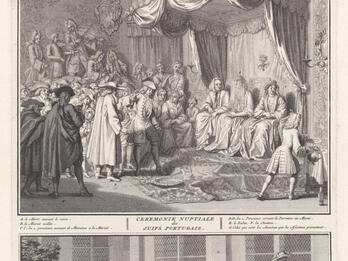Yosef omets (He Will Be Stronger): On Yom Kippur Eve
985. The ancient custom of kaparot [having a chicken slaughtered after symbolically transferring one’s sins to it] is well known; I will only write that my custom is also to say, based on the Maharal [Judah Loew], the verse, Sons of man, dwelling in darkness and the shadow of death, prisoners of poverty and iron (Psalms 107:10), before foolish ones (Psalms 107:17) and the other verses. It is also my custom to place both hands on each of the kaparot [slaughtered chickens] after they have been swung round the head, in accordance with the Tur [Jacob ben Asher (1269–1343)].
986. The custom is to circle the cemetery on the eve of Yom Kippur, even though one has already circled it on the eve of Rosh Hashanah. It is only if a relative has been buried within seven days that one does not circle it on one of them. If he was buried on the eve of Rosh Hashanah or on the eve of Yom Kippur, one circles it between the taking out of the dead and his burial. The error has come about as follows, for in our sins, there are few in these times who do not have a relative buried within seven days of the eve of Rosh Hashanah and the eve of Yom Kippur. Consequently, only a very small minority circle it on both the eve of Rosh Hashanah and the eve of Yom Kippur. Thus, people came to believe that the custom is not to circle it on both occasions, but this is an error.
987. It is a custom of especially observant men to immerse themselves on the eve of Rosh Hashanah and the eve of Yom Kippur three times, based on the Maharal in the name of Ha-rokeaḥ [Eleazar of Worms (ca. 1176–1238)], even though this practice is not in accordance with the Shulḥan ‘arukh. Even if it is clear to a man that he has not been contaminated by a seminal emission between the immersion of Rosh Hashanah and Yom Kippur, he must nevertheless immerse himself, because the immersion is not solely for purification but for repentance as well. Therefore, it was their practice to recite a confession under the water three times. In my opinion, it is fitting to recite the confession in alphabetical order, starting with ashamnu [“we have sinned,”]1 etc., as well as those specific sins one knows that he has committed, as I have written. [ . . . ]
989. It is a general custom for people to go to their friends on the eve of Yom Kippur to ask for forgiveness. Usually this is unnecessary, because they have not sinned to them, and even if by mistake one has sinned to his friends sometimes, is it not true that love covers all sins? In any case, there is no doubt that their envy and hatred has passed from them. This is certainly not the idea of this practice, but as the custom of our ancestors is considered like the Torah—for who knows what is in even one’s friend’s heart—I therefore do not say that one should not to go to one’s friends. Rather, one should not thereby negate a custom which is worthy and indeed obligatory. One should go to someone who he knows for certain that he has sinned against him, and if he does not wish to forgive him, one should bring friends to intercede on his behalf. Even if it is the other person who is guilty of wronging him, he should take the initiative to go to him to make peace between them. Over time, this requirement developed into the practice of going to one’s friends, but the custom of these generations, in which the secondary is made primary and the principle of forgiving one’s enemies is effectively repudiated, is a bad thing in my opinion.
992. One who is not healthy should not eat a lot in the last meal before the fast, but should enjoy light foods that are easy to digest, so that his body will be clean of gases at night and throughout this holy day, and from belches and hiccups, and so that he shall not need to go outside of the synagogue and relieve himself. In any event a person should refrain from drinking a lot of wine and other things that heat the body, so that he will not experience a seminal emission.
993. In our city here, the holy and awesome day for the atonement of our sins sometimes falls on the market day. Consequently, people are sometimes negligent about the final meal before the fast, which has to end while it is still daylight, before twilight, as they prolong it past its time. Thus, they make two mistakes: first, they eat too late; and second, after eating they take away or extinguish the fire, and someone might light it. It thus happens that even if they ate at the right time, in any event afterward the members of the household perform the aforementioned prohibitions [light fires]. Therefore, let every man be vigilant and careful to stop eating while it is still broad daylight, when the sun is at the treetops or above the roofs. This is something that does not apply just here, but rather it is a general rule for all the Sabbaths of the entire year. For during the winter one must also be precise and take great care to light fires while it is still broad daylight, for those who customarily put the ḥamin [stew that is passively cooked overnight and served the following day] in the oven and then to go to synagogue, especially when there is a wedding on the eve of the Sabbath. However, on this day [Yom Kippur] one must be even more careful, so that the Prosecutor will not find any hint of sin on us on the day that is set aside for the atonement of our sins. Thus, he will not be like one who immerses himself [in a ritual bath] while holding an unclean animal in his hand, perish the thought, and the Holy One will not, perish the thought, hear testimony against the Jews from the Prosecutor, as is written in the Tur. And if the beadle would be late in knocking on doors to call people to the synagogue because he is busy with his immersion, he should pray the afternoon prayer in private, so that he can hurry to eat. [ . . . ]
998. One begins reciting Kol Nidre2 before it is completely dark, because it is forbidden to dissolve vows on Sabbaths and festivals.
999. Those who sleep in the synagogue should lie down to sleep far from the holy ark. It is best to lie down in the women’s section. One should only sleep in the synagogue if his main intention is to recite many songs and praises and psalms to glorify the holy crown of God and the like, or to study of laws of repentance or the Order of the Service of the Day from Sefer mitsvot gadol [Great Book of Commandments (1247), by Moses of Coucy] or Maimonides or the Rosh [Asher ben Yeḥiel (1250–1327)], and out of necessity should they have to sleep a little bit. If their aim is only to sleep, I call upon them, “who asked you for this?” In the Order of the Service he wrote as follows: this matter is very grave for masters of Torah whose strength fails them; they should not allow themselves to fall ill (it is also possible that this will prevent them from praying properly during the day). However, if a penitent has the strength to suffer and he voluntarily accepts this practice upon himself, his repentance will be desirable and acceptable, and God will give him peace [see Judges 6:24]. [ . . . ]
1001. If a man sleeps in his bedroom where his wife is also present, or if he has a candle in his house by which he can see his wife before him, it must be lit in his room as well, so that he will refrain from sexual intercourse because of the light of the candle. It is also forbidden to touch his wife, as if she were menstruating. [ . . . ]
1004. My father and teacher, of blessed memory, wrote that if there is a circumcision on Yom Kippur, it is done after returning the Torah to the holy ark, before Musaf, and one gives the wine to the circumcised baby to taste. This is how things were done in Frankfort in the year 5349 [1589]. [ . . . ]
1007. If someone’s candle has gone out on Yom Kippur, it is a great prohibition to ask a gentile to light it. Even if he says something else to him, in any event if the gentile knows that they called him for the purpose of lighting, this falls into the category of telling a gentile to do work on the Sabbath. The Mahariv [Jacob ben Judah Weil] wrote that even a hint is forbidden, and even though the vast majority of rabbis are very, very lenient about this prohibition, with no real justification, in any event, at least on this holy and awesome day one should be as careful as one can about all possible prohibitions. For who knows whether his sins and his merits are equal, and this prohibition might tip the balance of transgressions. You can see how much good is lost by a simple statement, which brings no benefit at all, as he intended to perform the commandment [of having light] and yet he committed a great prohibition. This commandment is of no great concern, especially as he has already done what was incumbent upon him, which was to light the first candle. Even if you say that the second lighting is a great mitzvah, in any event who asked him to perform a mitzvah through a transgression? Therefore, one who would preserve his soul should not do any form of winking and hinting to a gentile about the lighting of the candle. Instead, they should say to the appointed gentile before Yom Kippur that he should be in the synagogue for that reason, and every hour or half hour he should walk around the synagogue of his own accord from corner to corner to inspect the extinguished candles, and light them again by himself.
Notes
[An alphabetical confessional prayer recited on Yom Kippur and during seliḥot (penintential services)—Trans.]
[“All vows,” the ritual announcement that opens the Yom Kippur service.—Trans.]
Credits
Published in: The Posen Library of Jewish Culture and Civilization, vol. 5.


